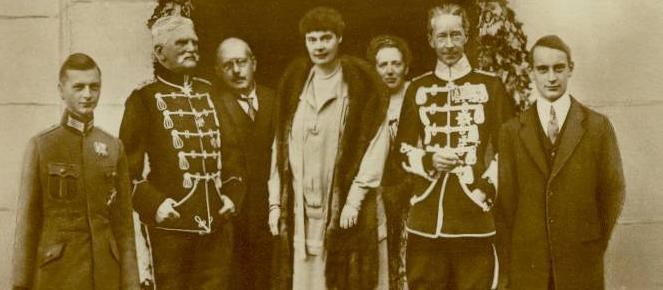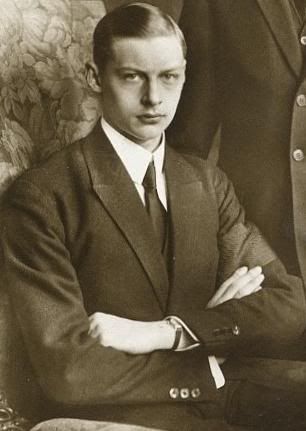Prince Wilhelm
From Kaiserreich
(→Political future) |
(→Political future) |
||
| Line 13: | Line 13: | ||
Due to the old age of both his grandfather and father, and the Kronprinz's poor personality, various political experts are focusing on the Prince Wilhelm himself, more considering the future reign of the Kronprinz as a transitional one. Instead, the Prince carries all the expectations around youth, and fits more to the Prussian and German ideals: rather intelligent, he is a confirmed military leader, displaying great courage on the battlefield. Even if he is officially member of the infantry, the Prince expressed great interest in Panzer strategies and befriended various generals. According to some relatives, he is also a determined and self-confident man. | Due to the old age of both his grandfather and father, and the Kronprinz's poor personality, various political experts are focusing on the Prince Wilhelm himself, more considering the future reign of the Kronprinz as a transitional one. Instead, the Prince carries all the expectations around youth, and fits more to the Prussian and German ideals: rather intelligent, he is a confirmed military leader, displaying great courage on the battlefield. Even if he is officially member of the infantry, the Prince expressed great interest in Panzer strategies and befriended various generals. According to some relatives, he is also a determined and self-confident man. | ||
| - | However, at 30, the Prince is still unmarried. This would not be a problem for the German Imperial Family, if the Prince was not in love yet. He met and fell in love with a fellow student at Bonn University, Dorothea von Salviati. The Kaiser and the Kronprinz refuse to approve a marriage with a member of the minor nobility, preferring that the second in line to the throne marry someone of equal rank (such as Kira Kirillovna, daughter of the head of the Russian Imperial Family in exile, [[Grand Duke Kyrill Vladimorivich]], due to the renewal of the monarchist cause in [[Russia]]). However, the Prince still resists his relatives' orders, even saying that he was ready to renounce to his rights to the throne only to wed Miss von Salviati. The question of Prince Wilhelm's affair still divides the German and international gotha, such as the British/[[Canada|Canadian]] [[Edward, Prince of Wales|Crown Prince Edward]], who surprisingly supported his German foe in his | + | However, at 30, the Prince is still unmarried. This would not be a problem for the German Imperial Family, if the Prince was not in love yet. He met and fell in love with a fellow student at Bonn University, Dorothea von Salviati. The Kaiser and the Kronprinz refuse to approve a marriage with a member of the minor nobility, preferring that the second in line to the throne marry someone of equal rank (such as Kira Kirillovna, daughter of the head of the Russian Imperial Family in exile, [[Grand Duke Kyrill Vladimorivich]], due to the renewal of the monarchist cause in [[Russia]]). However, the Prince still resists his relatives' orders, even saying that he was ready to renounce to his rights to the throne only to wed Miss von Salviati. The question of Prince Wilhelm's affair still divides the German and international gotha, such as the British/[[Canada|Canadian]] [[Edward, Prince of Wales|Crown Prince Edward]], who surprisingly supported his German foe in his wishes. |
[[Category:People]] [[Category:German-related topics]] [[Category:Royals]] [[Category:Army leaders]] | [[Category:People]] [[Category:German-related topics]] [[Category:Royals]] [[Category:Army leaders]] | ||
Current revision as of 22:03, 14 February 2015
|
Wilhelm Friedrich Franz Joseph Christian Olaf von Hohenzollern (born on July, 4 1906 in Potsdam, Germany) is a Prince of the House of Hohenzollern. The eldest son of the Kronprinz Wilhelm, he is the current second in line to the German and Prussian thrones, as he would be known under the name of Wilhelm IV. However, his tenure as future Crown Prince seems compromised by his affair with a minor noble, Dorothea von Salviati.
Biography
The son of the Kronprinz Wilhelm and his wife the Duchess Cecilie of Mecklenburg-Schwerin, Prince Wilhelm was born in 1906 in the Marmorpalais near Potsdam, where his parents were residing until their own home, Schloss Cecilienhof, could be completed. On his tenth birthday, he was created a lieutenant in the 1st Guards Regiment, and was given the Order of the Black Eagle by his grandfather, the Kaiser Wilhelm II. After the Weltkrieg, the Imperial Family, wanting to show its attachment to modernization, wanted that the Prince and his brothers attend the Potsdam Gymnasium like normal German teenagers. After graduating from secondary school, Wilhelm went on to study at the Universities of Königsberg, Munich and Bonn. However, he decided to join the Reichsheer in 1926, during the intervention in China. Helping to regild the prestige of the Hohenzollerns, the Prince served under the orders of General Hans von Seeckt, and displayed great courage in combat, being even wounded. He remained in the Imperial Army, thus honouring the military tradition of the Prussian high nobility. He is today a Generalmajor in the Reichsheer.
Political future

Due to the old age of both his grandfather and father, and the Kronprinz's poor personality, various political experts are focusing on the Prince Wilhelm himself, more considering the future reign of the Kronprinz as a transitional one. Instead, the Prince carries all the expectations around youth, and fits more to the Prussian and German ideals: rather intelligent, he is a confirmed military leader, displaying great courage on the battlefield. Even if he is officially member of the infantry, the Prince expressed great interest in Panzer strategies and befriended various generals. According to some relatives, he is also a determined and self-confident man.
However, at 30, the Prince is still unmarried. This would not be a problem for the German Imperial Family, if the Prince was not in love yet. He met and fell in love with a fellow student at Bonn University, Dorothea von Salviati. The Kaiser and the Kronprinz refuse to approve a marriage with a member of the minor nobility, preferring that the second in line to the throne marry someone of equal rank (such as Kira Kirillovna, daughter of the head of the Russian Imperial Family in exile, Grand Duke Kyrill Vladimorivich, due to the renewal of the monarchist cause in Russia). However, the Prince still resists his relatives' orders, even saying that he was ready to renounce to his rights to the throne only to wed Miss von Salviati. The question of Prince Wilhelm's affair still divides the German and international gotha, such as the British/Canadian Crown Prince Edward, who surprisingly supported his German foe in his wishes.

